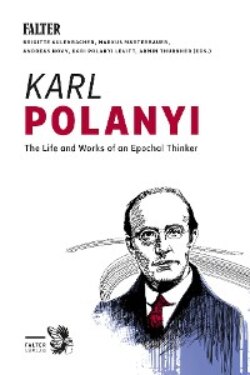Читать книгу Karl Polanyi - Группа авторов - Страница 7
FOREWORD
ОглавлениеMARGUERITE MENDELL
In 1988, two years after an international conference hosted by the Hungarian Academy of Sciences in Budapest to commemorate Karl Polanyi’s centenary, Kari Polanyi Levitt and I established the Karl Polanyi Institute of Political Economy at Concordia University Montreal. The Institute would provide a space to continue the interdisciplinary dialogue begun in Budapest, inspired by the life and works of Karl Polanyi. Yet the translation of The Great Transformation into Hungarian would have to wait 13 years. Within Hungarian academic circles at the time, Polanyi was largely known for his work in economic anthropology and economic history, with some exceptions. Situating his work politically generated much debate, especially following the publication of Polányi Károly: Fasizmus, Demokrácia, ipari Társadalom (Fascism, Democracy and Industrial Civilisation. Unpublished Work of Karl Polanyi.), a collection of Polanyi’s writings translated into Hungarian, edited by myself and Kari Polanyi and launched at the Budapest conference. I recall this period because it created an international Polanyi community of scholars, students, activists, public intellectuals that ushered in the Polanyi renaissance over the next two decades, marked by the fall of the Berlin Wall in 1989, the Seattle protests in 1999 and the 2008-2009 global financial crisis. Cutting across these events and the growing interest in the work of Karl Polanyi and into the 21st century, is climate change and the threat to planetary survival.
Spaces for Polanyi-inspired dialogue have since established in Seoul and Budapest in 2014 and most recently in Vienna in 2018. What we refer to as sister institutes in North America, Europe and Asia, are contributing to a broad, international Polanyi conversation, each with its own mandate and institutional anchors. The Institute in Seoul is a cooperative, with members drawn from all sectors of society. In Budapest, Polanyi dialogue is integrated into an academic programme at the Karl Polanyi Research Center for Global Social Studies within Corvinus University. The International Karl Polanyi Society established in Vienna in 2018, a unique collaboration between universities in Austria and the Vienna Chamber of Labour, is dedicated to widening the Polanyi conversation between academics and social actors on challenges and transformations of the 21st century. The Polanyi Institute in Montreal, the repository of the Karl Polanyi Archive has received visiting researchers and has hosted seminars and biennial international Polanyi conferences for over three decades.
This volume, a remarkable collection of short essays on Karl Polanyi, first appeared in German as a supplement to the weekly Vienna newspaper Falter. It includes several papers presented at the inaugural conference of the International Karl Polanyi Society in May 2018 as well as invited contributions, providing readers with an extraordinary opportunity to discover or rediscover the breadth of the work and influence of Karl Polanyi. Many essays will introduce German authors to an English readership for the first time. The numerous short sketches navigate across many Polanyi themes. The volume covers a wide spectrum of themes, from the reasons for the renewed interest in Polanyi today to the revisiting of fundamental concepts in Polanyi’s writings, from the compatibility and differences between Polanyi and key 20th century theorists such as von Mises, Hayek and Keynes to the impact of Polanyi’s life and engagement in Red Vienna on his thought and lifelong commitment to democratic socialism, and the contemporary relevance of his early writings on freedom and democracy. Biographical essays introduce readers to Polanyi’s early life in Austria and Hungary and the social, political and cultural upheavals of the times. A rare contribution on Karl Polanyi’s relationship to his brother Michael and an engaging interview with his daughter Kari Polanyi deepen our understanding of the formative influences that shaped Polanyi’s thinking throughout his life.
Essays in this volume also explore the resonance of Polanyi’s concepts and analysis to critical issues such as the commodification of care, the emancipatory and destructive impact of technology in the digital age, the search for alternatives rooted in solidarity and community and their capacity to counter a market-driven global agenda. Essays on the rise of right-wing populism as a powerful counter-movement to neoliberalism and the growing threat to freedom recall Polanyi’s writings on fascism as a countermovement to market liberalism.
This volume is published as we face the gravest crisis of our times. The Covid-19 pandemic has revealed the weakness and destructive power of capitalism. As thousands perish from the virus, as the global economy lurches on the edge of collapse, as government spending soars in unimaginable magnitude and as a desperately awaited vaccine must emerge as a global public good, Polanyi-influenced debate assumes an urgency. The publication of this volume of essays in English translation comes at a time of deep societal disruption that no one could have predicted. How societies will respond to this global crisis requires a reset of priorities. The challenges of the pandemic summon a global response, a global countermovement to restore our habitation, in Polanyi’s words. Any attempt to resume business as usual is futile. Nothing is usual anymore. Polanyi’s vision for economic democracy and freedom in a complex society is realisable if the many countermovements around the world insist, through their collective actions, that nothing less is acceptable.
I wish to extend my congratulations to the editors of this important volume. And I wish to commend Falter for publishing this as a supplement to a weekly newspaper and bringing these ideas to a large public and now to English-speaking readers. Polanyi was a scholar, a journalist, a public educator and an academic in the later years of his life. He was a public intellectual. His years as a journalist began in Vienna. It is more than fitting that Falter is publishing this exceptional collection dedicated to the life and works of Karl Polanyi.
References
Polanyi, Karl (1944/2001): The Great Transformation: The Political and Economic Origins of Our Time. Boston: Beacon Press.
Polányi, Károly (1986): Fasizmus, Demokrácia, ipari Társadalom. Budapest: Gondolat.
